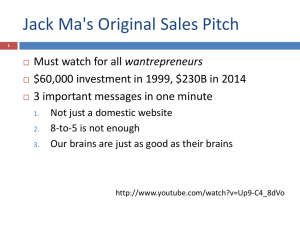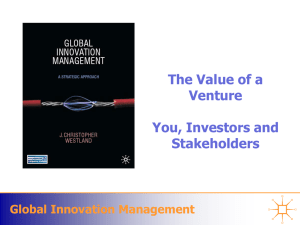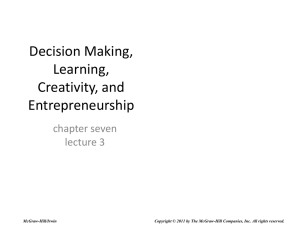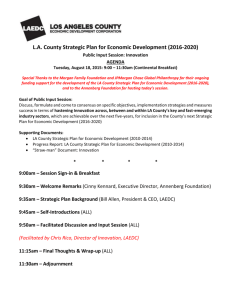Microsoft Word 2007 - UWE Research Repository
advertisement
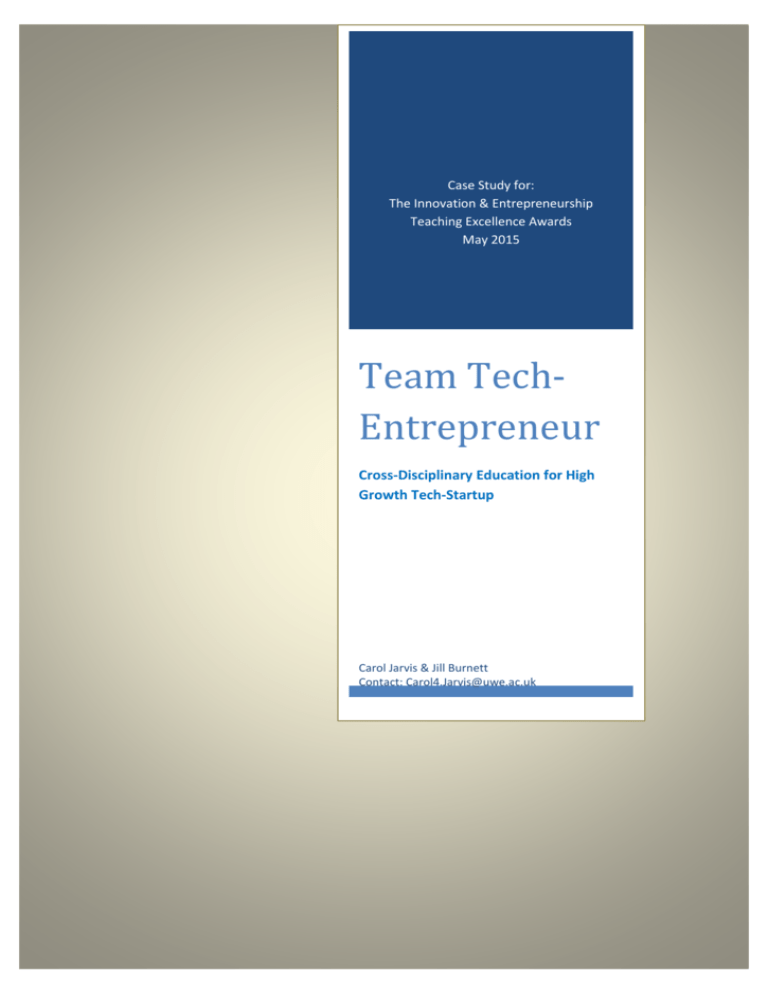
Case Study for: The Innovation & Entrepreneurship Teaching Excellence Awards May 2015 Team TechEntrepreneur Cross-Disciplinary Education for High Growth Tech-Startup Carol Jarvis & Jill Burnett Contact: Carol4.Jarvis@uwe.ac.uk Team Tech-Entrepreneur: Cross-Disciplinary Education for High Growth Tech-Startups Introduction The Team Tech-Entrepreneur initiative is inspired by two strands of entrepreneurial activity at the University of the West of England: Bristol Business School’s BA Business (Team Entrepreneurship) builds its curriculum around learning entrepreneurship through practice, whilst Bristol Robotics Laboratory’s incubator supports student and new graduate technology business start-ups. These synergistic initiatives exhibit remarkable and encouraging success, empowering and motivating students to learn, explore and use their talents to the full, both individually and in teams. We now propose to bring our expertise together to create a ‘Team Tech-Entrepreneur’ 4-year integrated Masters, where students form multi-disciplinary teams and are supported to achieve academically across science and business, while initiating their chosen technology business start-up. Our aim is to equip graduates with the technical, business and team-working capacities, confidence and track record they need to develop their start-ups into successful technology businesses. The BA Business (Team Entrepreneurship) was launched in September 2013: an innovative three year degree programme that is team-based and adopts the principles of “learning by doing”. It aims to prepare graduates who are ‘ready and able’ to make a contribution in society and in the workplace; confident, creative future leaders who are solution-focused, resilient learners, with an entrepreneurial mind-set. Based on the ‘Tiimiakatemia’ model developed and pioneered in Finland, students (or ‘team entrepreneurs’) form companies (with up to 20 members in each), in which they trade for the duration of their degree. These are legallyconstituted organisations in which the university has no stake. All company members have an equal shareholding and, during the course of the programme, each will take leadership and team roles on projects, enabling them to find their strengths and passions. Case Study: Open Bionics is a BRL incubator company that make low-cost 3D-printed prosthetic hands. Most of the world’s 11.4m hand amputees have no prosthesis, and the high cost of most prosthetic hands is a significant factor. A company with a strong social mission to “arm the masses”, Open Bionics hands cost $1,000, two orders of magnitude less than other prosthetics. www.openbionics.com Avoiding traditional classroom formats, each company has two training sessions a week with their team entrepreneurship coach (TE coach), 36 weeks of the year. Interactive ‘professional workshops’ and a ‘business boot-camp’ cover essentials including customer relationships, finance, marketing, business planning, legal, HR, IP, health and safety and project management. ‘Skills development’ sessions focus on personal and team development, fostering skills such as coaching and mentoring, leadership and giving and receiving feedback. Regular creative conversations with entrepreneurs and leaders from diverse backgrounds provide an opportunity to learn from the experience of others and home in on market challenges that may be addressed by innovative technology products and services. Academic texts are selected, with guidance from the coaching team, and read when they are relevant to a project and ideas therein can be put into practice. Depth of knowledge and understanding is assessed through ‘book reviews’. Assessments combine academic rigour with a clear application to practice. Issues of ethics, ethical decision-making, sustainability, organizational citizenship and global citizenship are embedded throughout the curriculum. Team Tech-Entrepreneur: Cross-Disciplinary Education for High Growth Tech-Startup Page 1 The Bristol Robotics Laboratory (BRL) technology business incubator was set-up as a very low cost initiative in September 2013 with a cohort of 11 student and recent graduate founders and 8 startup concepts. With support from BRL staff and access to BRL equipment, networks and expertise, these businesses have raised over £2m in R&D funding to date, creating over 30 FTE graduate jobs and with several technology products near or on the market. Significant awards include: People’s choice at Pitch@Palace; CES product innovation of the year 2014; 2nd in Intel’s recent global wearables competition; selection to join the TECHSTARS/Qualcomm 2015 accelerator program and a finalist place to pitch at Innorobo (France) in July. Demand for incubation space now outstrips supply and the initiative is attracting significant interest from politicians, technologists, funders, students, university staff, technology entrepreneurs and other stakeholders. The Strategy The main aim of this programme is to develop investible student entrepreneurs with the skills, knowledge, capacities and ‘mind-sets’ to succeed as founders of entrepreneurial technology businesses. To this end the ‘Team Tech-Entrepreneur’ strategy focuses on “bringing the culture of the innovative workplace into the ‘classroom’ ” whilst keeping the learner and their learning firmly in focus. Success depends on creating an environment where the students can develop strong technical competence alongside entrepreneurial capacities, enabling them to develop and evaluate innovative technology business ideas in cross-disciplinary teams. Case Study: The Helpful Water Co was co-founded by Zac Alsop and Kieran Lane and is a Bristol-based organisation dedicated, in their words, “to providing the coolest and most planet-friendly packagedwater product in Europe.” Their focus is on the introduction of carton packaging, made from majority renewable materials, as an alternative to harmful PET plastic for water packaging. Their tag line - ‘It’s good to be good’ – encapsulates their brand values, as well as their passion and sense of fun. Others have recognised the strength of their idea and their commitment to it; they were finalists in the ‘Ben and Jerry’s Core’ competition and have recently gained a space in a Bristol accelerator. The approach draws on and develops our experience on the innovative and successful BA Business (Team Entrepreneurship) in adopting and adapting the team coaching approach to the technology environment. This includes role modelling the principles of team entrepreneurship and applying the TE coaching philosophy with rigour, consistency and transparency alongside their structured technology education and support from a technology entrepreneur in residence. Core to this approach is that whilst the programme team set expectations and parameters, team entrepreneurs are responsible for interpreting them and bringing them into practice. For example: There is an expectation that unless they are undertaking client visits/project work, students will be in the dedicated, open-plan workspace during normal working hours. The company decides what constitutes a working day, policies on holidays and flexitime, how they will meet their work commitments outside of term time, how they monitor attendance and deal with under-performance, how project work is defined, etc. In short, they begin to instil business disciplines, develop as a high performing team and hold each other to account. Timing of training sessions is fixed by the programme team and students are expected to attend all training sessions. The students (through their companies) have strong input into the scope of this training: who leads it, how projects are reported on and monitored and how minutes are kept and learning is shared. As the students and companies develop, so Team Tech-Entrepreneur: Cross-Disciplinary Education for High Growth Tech-Startup Page 2 the role of the TE coach shifts from providing ‘strong guidance’ towards acting more as a consultant. Students are encouraged to seek multiple perspectives on their business decisions while taking full responsibility for their own decisions and actions. Academic learning is linked to business start-up projects through the completion of ‘book reviews’ that require team entrepreneurs to read relevant theories, ideas and methods; summarise these; reflect on how they might apply; and evaluate their relevance. Learning is enhanced through pre/post- project logs that make explicit: project and learning objectives; theories and methods to apply; skills to develop; reflection on what went well/less well; lessons learned; and what the team will do differently next time as a result. Students will also attend scheduled learning linked to their chosen technology disciplines, studying alongside students on relevant technology degrees but with assessment linked to application of their learning, measured by progress against milestones in their start-up business plan. Infrastructure Case Study: Unique Access is a market research company specialising in research amongst students, e.g. for a frozen yoghurt company. Having challenged the Vice-Chancellor to identify his biggest problem, they secured a contract to explore improving student retention based on analysis of primary research and developing and using predictive software to identify students at risk of dropping out. Unique Access is now placing greater emphasis on the further development of its own proprietary software and rolling out to other institutions and industries. The potential of both the business and its two co-founders - Jamie Rawsthorne and George Sanderson – was recognised when they won a space in ‘MASS Challenge’, the largest business accelerator in the world, against stiff competition. In terms of staff time, use of virtual learning environments, IT and academic support systems, the programme consumes a similar level of resource to other business and management programmes. Access to equipment, workshops and technician support will be provided as for standard technical courses. However, the programme does make different use of space and place different demands on staff time and administrative systems. For example, start-up teams work all hours and receive many external visitors. They may have significant storage and security/privacy requirements around their IP and the learning environment and approach needs to take full account of this and the particular demands it places on both the staff team and other students. To foster peer learning, cross-fertilisation and idea incubation, the programme runs in a Team Entrepreneurship Hub. Each company has its own open plan space, with shared formal and informal meeting spaces. There are rooms (equipped with AV) for training sessions and professional workshops, with occasional use of other learning spaces for events such as business bootcamps and innovation challenges. Students have full access to university facilities and academic, pastoral and administrative support. The programme uses similar levels of staff time to other programmes, but very differently. Team entrepreneurs typically have the same coach for the duration of the programme and have an (different) Academic/Personal Tutor drawn from the coaching team. There is typically a coach present in the Hub and available to work with individuals or small groups throughout the year. In this way coaches and students form supportive and rewarding learning relationships. In addition to this, students will have access to a part-time Technology entrepreneur in residence on a booked or Team Tech-Entrepreneur: Cross-Disciplinary Education for High Growth Tech-Startup Page 3 just-in-time basis, who can also introduce specialist contacts in the university or externally as needed. Alongside finding suitable space, and managing coaching timetables, the biggest infrastructure challenge is managing the issues that arise from a 36 week ‘teaching’ year, particularly around assessment deadlines and Field Boards. Challenges and Lessons Learned The BA Business (Team Entrepreneurship) programme seeks to develop rounded graduates, with the skills, capacities and mind-sets necessary to succeed as founders and leaders in entrepreneurial organisations. These are graduates who make an outstanding contribution, whether in their own business or in an established organisation, from day one. In support of this, the main educational aims of the programme are to develop graduates who are: Highly networked, collaborative entrepreneurs committed to lifelong learning; Equipped with an all-round understanding and capacity to build organisations, manage and lead projects; Committed to their own and others’ development; Skilled in team working and in using the creative power of the team to build customer value; Confident and resilient with the capacity to lead others. Case Study: Omnidynamics was formed by two third year robotics students, Greg Gruzecki and David Graves, to take advantage of the expanding market for 3-D printer accessories. Their first product ‘Strooder’ enables the consumer to produce otherwise expensive 3D-printer filament from either cheap plastic pellets or recyclable plastics. Strooder enables the consumer to create filament of bespoke colour and plasticity and is sold online as a ready-to-use unit. A successful Kickstarter campaign, supported by CrowdReach (below) enabled OmniDynamics to bring Strooder to market and the team are completing retail arrangements with 25+ distributors including household names such as Cartridge World and RS Components. www.omnidynamics.co.uk The new Team Tech-Entrepreneur programme will foster these attributes in the context of technology-based organisations and the cross-disciplinary skills and teams needed to run them successfully. Our target is that, by graduation, Team Tech-Entrepreneurs will create technology businesses that present attractive career options and make a measurable contribution to the local/regional economy. These goals require students to take full responsibility for their learning, decisions and behaviours. Critically, whilst students receive support and developmental guidance from the TE coaches, they are not given ‘answers’. The challenge is to take responsibility in a context that mirrors the levels of uncertainty and complexity graduates are likely to face in the start-up/SME workplace. This requires significant shifts in mind-set and behaviour for many students. A key lesson in our experience so far is that, trusted with taking responsibility in a supportive and developmental learning environment and with readily available coaching, our student entrepreneurs have risen admirably to the challenge and exceeded expectations. In setting-up and running their own companies they learn more readily about the risks and responsibilities that accompany the rewards. Team Tech-Entrepreneur: Cross-Disciplinary Education for High Growth Tech-Startup Page 4 Feedback from Learners and Other Stakeholders Feedback from the business community and (potential) customers and the perceptions of the team entrepreneurs themselves are very positive, with comments such as: “We are doing the employers’ fair today and have met a number of students on your course. They are fabulous and so exciting ...” (local SME); “I have never seen first year students like this anywhere.” (International Education Representative); “In the short time since we started the course we have all developed and learnt the key skills essential to the success of our companies. Personally, the main skill I have developed is being able to work confidently in a large group.” (Team Entrepreneur); “This incubator is unique in the UK, can you share the recipe for success?” (Senior UK and EU Robotics advisor). Case Study: CrowdReach was set up in response to the lack of support and education for start-ups looking to raise capital through crowdfunding. It is predicted that over the course of this year (2015) $34.4bn will be raised through crowdfunding, however currently over 60% of campaigns fail to reach their target. CrowdReach works with entrepreneurs to plan, create, market and manage their crowdfunding campaigns, helping them to successful raise the funding they need. Founded in 2014 by Bradley Green, Rob Wilson and Will Dooley, the trio are now looking to grow the company and have recently been accepted on a six month accelerator programme in Bristol. www.crowdreach.co.uk Learning Outcomes and Evaluation In Finland, where the team entrepreneur approach was pioneered and similar programmes have been running for much longer, 91% of alumni are in graduate level employment 6 months after graduation and 47% of graduates are running their own business 2 years after graduation. At the time of writing the BA Business (Team Entrepreneurship) and the BRL incubator have each been running for less than two years – but already the team entrepreneurs and students and young graduates involved in the incubator are achieving well ahead of expectations. Amongst team entrepreneurs, some have made the transition to new ways of learning more quickly and easily than others but the programme team and regular external visitors see marked increase in confidence, maturity, professionalism and team working skills, and growing awareness of what it means to take responsibility for their own learning and actions, and as they near the end of their second year, many of the team entrepreneurs are operating as accomplished project managers with good leadership capacities. They are strong networkers, including a number who have attended international networking events in Hungary, Spain, and Finland, for example, as well as the SOL Global Forum in Paris. Two team entrepreneurs spoke at the House of Commons launch of the ‘21st Century Leaders’ report. The Team Tech-Entrepreneur: Cross-Disciplinary Education for High Growth Tech-Startup Page 5 array of projects is also impressive, showing creativity, dedication and persistence and a will to make things happen. Case study examples from the existing team entrepreneurship and BRL incubator programmes are included as illustrations to give a flavour of what can be achieved. The potential of our cross-disciplinary approach is exemplified by the collaboration between OmniDynamics and CrowdReach (see case studies). Learning takes place simultaneously at multiple levels. On the one hand, students are learning to scope and manage projects and what it means to add value to customers. Then, through collaboration and healthy competition, they are discovering their own strengths and passions and where they can make a difference. In taking on the risks and responsibilities associated with settingup and running their own companies, our student entrepreneurs understand what it really means to take responsibility for creating their own futures and career options. And they will leave us with an expanded set of options from pursuing their own business to taking up a leadership role in an entrepreneurial organisation. The Reach Robotics case study below is a great example. Case study: Reach Robotics Limited To make a lasting impression on people (particularly the young) through technology and STEM, their imagination needs to be captured first. Reach Robotics are creating the world’s first robotics gaming system to make robotics more fun and engaging because most toys and kits are passive and get boring fast. The launch product is a Robotic Gaming system. MechaMonsters are 4 legged robots that battle each other and are controlled through smartphone or tablet providing personalized, dynamic and engaging game play scenarios that happen in real life and a fun and simple way to get into robotics. Reach Robotics founder, Silas, is a recent UWE graduate with a 1st class degree in robotics and a passion for legged robots and gaming. in the last 16 months, with support from BRL and others, he has raised funding, recruited a skilled team, developed nearproduction-ready prototypes and secured a place in the TechStarts/Qualcomm accelerator in San Diego for June 2015. Extensive press coverage includes BLOOMBERG TV Fighting Robots Will Spur STEM Education: Adekunle; FINANCIAL TIMES Pitch@Palace - Reach Robotics and TECHSPARK Interview: Building for the future. www.reachrobotics.com Development Plans The new ‘Team Tech-Entrepreneurs’ 4 year integrated Masters programme will combine business and technology education with business incubation, enabling student entrepreneurs to graduate with a potentially sustainable technology business and the skills and resources to develop it successfully. Our target for each cohort is 10 technology start-ups, with £2m R&D funding raised and 30 jobs created by graduation. Once established, the course will produce highly-skilled knowledge workers every year, making an immediate contribution to the regional economy. The proposed programme will be jointly operated by the Bristol Business School and the Faculty of Environment and Technology (home of Bristol Robotics Laboratory) and will enable students to layer business and innovation education over a science education with specialisations. Students will be encouraged to form multidisciplinary teams to explore potential markets and technology solutions, with increasingly focused learning provision once a business idea has been selected - by the end of Team Tech-Entrepreneur: Cross-Disciplinary Education for High Growth Tech-Startup Page 6 their second year. The teams will then have two years’ of accommodation, facilities, tuition and support to achieve significant product and business development, prior to graduation. Assessment will be driven by achievement of technical and business milestones; ability to reflect on progress and refine plans; personal, team and business development. As Rob Wilson, Co-founder of CrowdReach describes his experience of the BA Business (Team Entrepreneurship), "I can only describe the course as life changing. It has allowed me to develop an entrepreneurial mindset and opened my eyes to what is possible." Team Tech-Entrepreneur: Cross-Disciplinary Education for High Growth Tech-Startup Page 7


